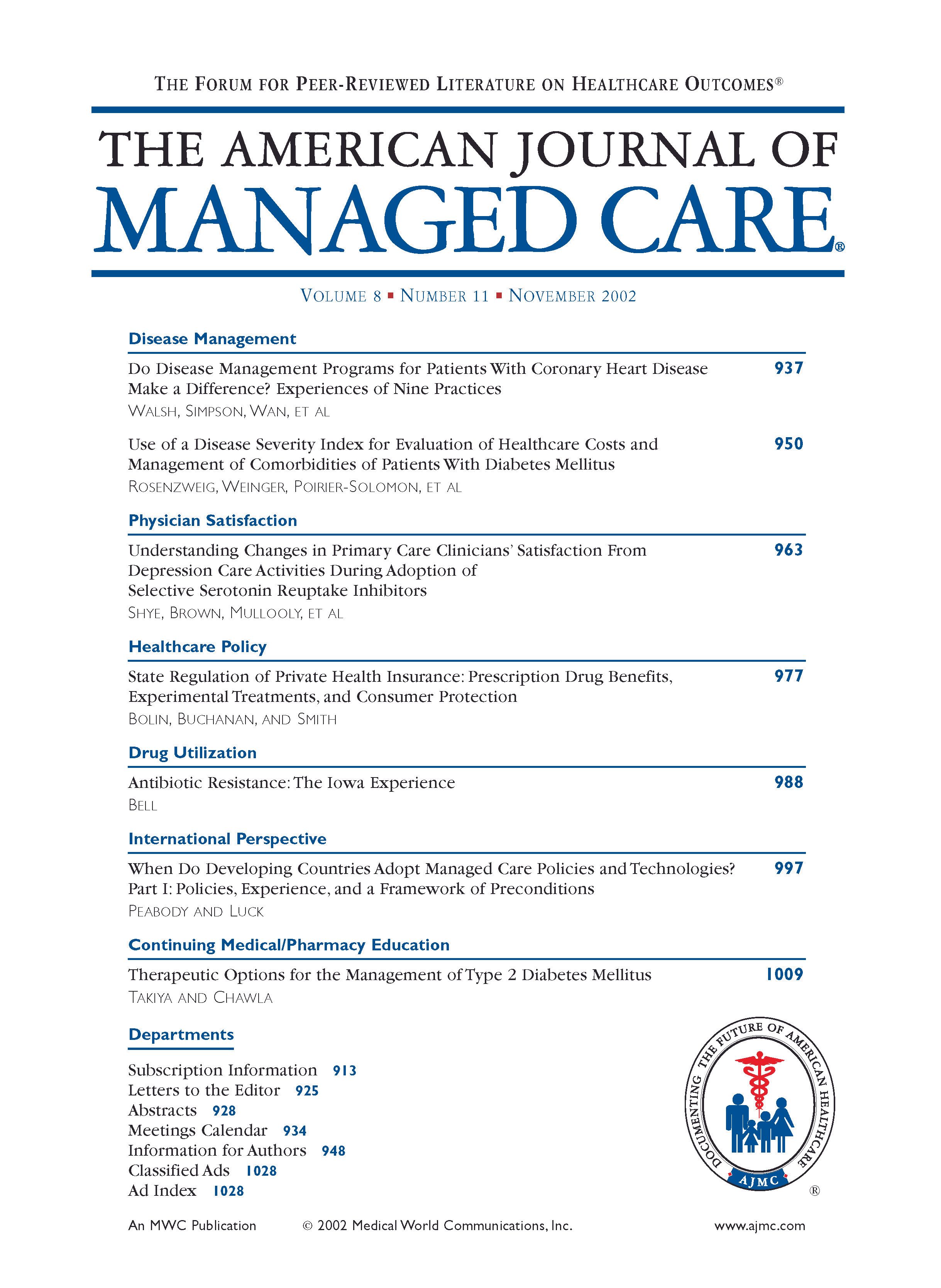- Center on Health Equity & Access
- Clinical
- Health Care Cost
- Health Care Delivery
- Insurance
- Policy
- Technology
- Value-Based Care
Correspondence regarding, "Potential Application of the National Kidney Foundation's Chronic Kidney Disease Guidelines in a Managed Care Setting"
TO THE EDITORS
We were pleased to see Thorp and Eastman1 have outlined a proposal to more aggressively and proactively implement the National Kidney Foundation Chronic Kidney Disease (CKD) Guidelines2 across a patient population. This approach is feasible in most health maintenance organization (HMO) and university settings, and should be applied more widely.
In fact, over the past year we have already put into practice such a system of screening for advanced chronic kidney disease. In our system, an HMO with a patient population greater than 200 000 with more than 400 dialysis patients, a central database contains information with regard to demographics, labs and diagnostic studies, and consultation. We periodically screen our population for patients with stage 3, 4, and 5 CKD, as well as patients with heavy proteinuria, who have not been referred to Nephrology. The Modification of Diet in Renal Disease formula for glomerular filtration rate estimation, which is based on easily accessible data including creatinine, gender, race and age,3 is used to stratify the stages of CKD. A nephrologist reviews the list, deleting patients with very advanced age, terminal illness, and transient conditions such as acute renal failure or pre-eclampsia. The primary care physician (PCP) is contacted by e-mail, and if agreeable, his/her patient is then contacted and consultation is scheduled.
So far this process has been successful. Patients with advanced CKD who for one reason or another had "fallen through the cracks," are receiving predialysis and transplant education, and important issues such as progression, anemia, and bone management are being addressed. Several patients have had fistulas placed. Up to this point, our focus has been mainly on recruiting the patients at greatest risk, with CKD stages 4-5, but we are also developing a system through which a nephrologist and renal pharmacist can identify and manage all patients with CKD stage 3, 4, and 5 in a large population.
A major problem with current clinical practice, in which only PCP's initiate consultation, is that there is significant variation in when patients are referred to a nephrologist. This can lead to inefficient utilization of resources. In our practice, with this variation in referral patterns, some patients with stage 1 CKD get referred and some patients do not get referred before reaching stage 5. In fact the NKF recommends referring at stage 4 and sometimes at stage 3. We plan to continue to both educate PCP's as to currently recommended practice (to decrease too—early referrals) as well as recruit unreferred patients with advanced disease. Standardizing the nephrology consultation process is a way to maximize effective care of renal disease in a population, and is an achievable and cost-effective goal. As Steinman says, "the devil is in the details."4 But the approach that Thorp advocates is an approach that actually works, in our experience thus far.
Alan Lau, MD
Ken Forbes
Kaiser Permanente, Hawaii Region
Am J Manag Care.
1. Thorp ML, Eastman L. Potential application of the National Kidney Foundation's Chronic Kidney Disease Guidelines in a managed care setting. 2004;10:417-422.
Am J Kidney Dis.
2. National Kidney Foundation. K/DOQI clinical practice guidelines for chronic kidney disease: evaluation, classification, and stratification. Feb 1, 2002;39(2 suppl 1):S1-S266.
Ann Intern Med.
3. Levey AS, Bosch JP, Lewis JB, Greene T, Rogers N, Roth D. A more accurate method to estimate glomerular filtration rate from serum creatinine: a new prediction equation. Modification of Diet in Renal Disease Study Group. 1999 Mar 16;130(6):461-470.
Am J Manag Care.
4. Steinman TL. Using guidelines to improve care of patients with chronic kidney disease. 2004;10:417-422.
IN REPLY
The kidney disease program described by Drs. Lee, Forbes, and Lau represents an integration of electronic medical records and clinical practice guidelines that will hopefully become the norm. Whether such a system will ultimately prove cost effective and improve patient outcomes remains unclear, but its feasibility is a reassuring first step.
Micah L. Thorp, DO, MPH
Milwaukie, Oregon

Building Trust: Public Priorities for Health Care AI Labeling
January 27th 2026A Michigan-based deliberative study found strong public support for patient-informed artificial intelligence (AI) labeling in health care, emphasizing transparency, privacy, equity, and safety to build trust.
Read More
Ambient AI Tool Adoption in US Hospitals and Associated Factors
January 27th 2026Nearly two-thirds of hospitals using Epic have adopted ambient artificial intelligence (AI), with higher uptake among larger, not-for-profit hospitals and those with higher workload and stronger financial performance.
Read More
Motivating and Enabling Factors Supporting Targeted Improvements to Hospital-SNF Transitions
January 26th 2026Skilled nursing facilities (SNFs) with a high volume of referred patients with Alzheimer disease and related dementias may work harder to manage care transitions with less availability of resources that enable high-quality handoffs.
Read More
Specialty and Operator Status Influence Electronic Health Record Use Variation
January 22nd 2026Operators demonstrated specialty-specific differences in electronic health record efficiency, timeliness, and after-hours use, highlighting how workflow and training shape documentation behaviors across medical disciplines.
Read More

